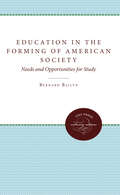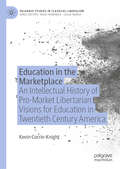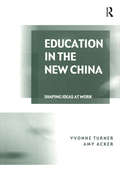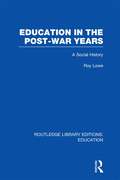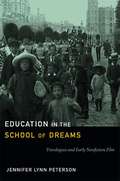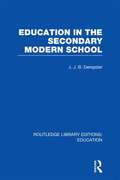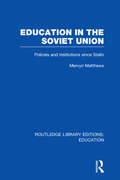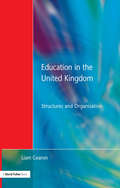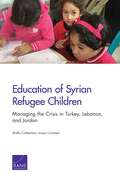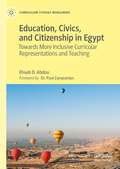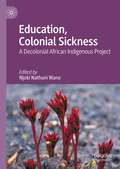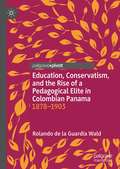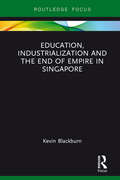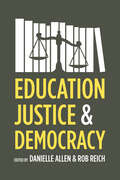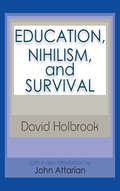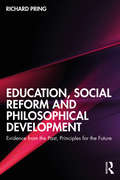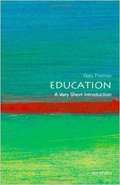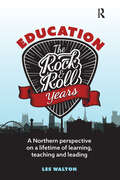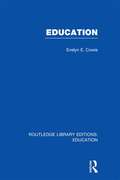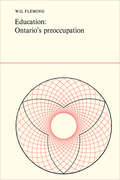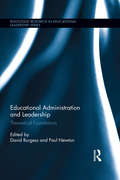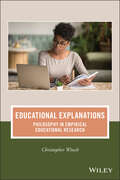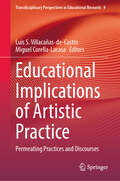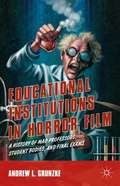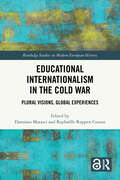- Table View
- List View
Education in the Forming of American Society: Needs and Opportunities for Study (Published by the Omohundro Institute of Early American History and Culture and the University of North Carolina Press)
by Bernard BailynIn a pungent revision of the professional educator's school of history, Bailyn traces the cultural context of education in early American society and the evolution of educational standards in the colonies. His analysis ranges beyond formal education to encompass such vital social determinants as the family, apprenticeship, and organized religion.Originally published in 1960.A UNC Press Enduring Edition -- UNC Press Enduring Editions use the latest in digital technology to make available again books from our distinguished backlist that were previously out of print. These editions are published unaltered from the original, and are presented in affordable paperback formats, bringing readers both historical and cultural value.
Education in the Marketplace: An Intellectual History of Pro-Market Libertarian Visions for Education in Twentieth Century America (Palgrave Studies in Classical Liberalism)
by Kevin Currie-KnightThis book offers an intellectual history of the libertarian case for markets in education. Currie-Knight tracks the diverse and evolving arguments libertarians have made, with each chapter devoted to a different libertarian thinker, their reasoning and their impact. What are the issues libertarians have had with state-controlled public schooling? What have been the libertarian voices on the benefits of markets in education? How have these thinkers interacted with law and policy? All of these questions are considered in this important text for those interested in debates over market mechanisms in education and those who are keen to understand how those arguments have changed over time.
Education in the New China: Shaping Ideas at Work
by Yvonne Turner Amy AckerThe effects of the de-regulation of the Chinese university system have been nothing short of spectacular. For the first time since 1949, students possessing neither gifted intellect nor political connections have been able to share in the benefits of higher education, while a flood of international educators have opened up a previously cloistered and politically sensitized academic world. This fascinating book examines China’s higher education system, and how it’s new and unique blend of foreign and Chinese perspectives impact on both the lives of students and academics and wider Chinese society. Viewed with suspicion as a new type of Chinese by the older generation and by the government, they are at the same time the very entrepreneurs driving the economic and social revolution sweeping the country. Using a range of in-depth interviews and unique research, it provides open and often frank accounts of life, work and education in China, from the Cultural Revolution to the creation of its market-focused entrepreneurial generation. Candid and illuminating, this is a book no serious reader of Asian studies, comparative education or Asian sociology will want to be without.
Education in the Post-War Years: A Social History (Routledge Library Editions: Education)
by Roy LoweThis book provides an overview of the relationship between the sweeping social changes of the post-war period and education in England. It outlines the major demographic cultural and socio-economic developments which made new demands of the education service during the twenty years following the War and analyses the responses made by schools, colleges and universities. The book provides not only an informed narrative of the development of formal education, but also an authoritative account of the ways in which suburbanisation and the growth of the new property-owning middle class determined both the rhetoric of education and the structure of the system which emerged through the implementation of the 1944 Education Act.
Education in the School of Dreams: Travelogues and Early Nonfiction Film
by Peterson Jennifer LynnIn the earliest years of cinema, travelogues were a staple of variety film programs in commercial motion picture theaters. These short films, also known as "scenics," depicted tourist destinations and exotic landscapes otherwise inaccessible to most viewers. Scenics were so popular that they were briefly touted as the future of film. But despite their pervasiveness during the early twentieth century, travelogues have been overlooked by film historians and critics. In Education in the School of Dreams, Jennifer Lynn Peterson recovers this lost archive. Through innovative readings of travelogues and other nonfiction films exhibited in the United States between 1907 and 1915, she offers fresh insights into the aesthetic and commercial history of early cinema and provides a new perspective on the intersection of American culture, imperialism, and modernity in the nickelodeon era. Peterson describes the travelogue's characteristic form and style and demonstrates how imperialist ideologies were realized and reshaped through the moving image. She argues that although educational films were intended to legitimate filmgoing for middle-class audiences, travelogues were not simply vehicles for elite ideology. As a form of instructive entertainment, these technological moving landscapes were both formulaic and also wondrous and dreamlike. Considering issues of spectatorship and affect, Peterson argues that scenics produced and disrupted viewers' complacency about their own place in the world.
Education in the Secondary Modern School (Routledge Library Editions: Education)
by J JB DempsterThe articles which make up this book, originally published in the journal The Schoolmaster were originally published at the time of The Education Act 1944 which changed the education system for secondary schools in England and Wales. This Act made secondary education free for all pupils and introduced the tripartite system of education, of which secondary modern schools were one part. This volume examines issues of low self-esteem among pupils at secondary modern schools, academic versus practical curricula, assessment and challenges for teachers – issues which are still pertinent today.
Education in the Soviet Union: Policies and Institutions Since Stalin (Routledge Library Editions: Education)
by Mervyn MatthewsThis book provides a comprehensive survey of the successes and failures of education and training in the Khrushchev and Breshnev years. The author gives an objective assessment of the accessibility of the main types of institution, of the contents of courses and of Soviet attempts to marry the functioning of their education system to their perceived economic and social needs. In addition the book has many useful and original features: For ease of analysis it summarises in diagram form complex statistics which are not usually brought together for so long a time period. It provides a systematic account of educational legislation; Matthews’ comparison of series of official decrees will allow subtle shifts in government policy to be accurately charted. Particular attention is also paid to a number of issues that are often neglected: the employment problems of school and college graduates; the role and professional status of teachers; political control and militarisation in schools; the close detail of higher education curricula; and the rate of student failure. Of special value is the chapter on those educational institutions which are often omitted from Western studies and which are hardly recognised as such in most official Soviet sources.
Education in the United Kingdom: Structures and Organisation
by Liam GearonThis accessible book provides a basic understanding of the structure and organization of education in the United Kingdom in a time of rapid change and devolved government. It is designed as an introductory guide and reference work for all with an interest in education, including trainee and newly qualified teachers, university lecturers, school-based mentors, and governors and managers. It contains an accessible summary of key issues and contributions from some of the best-known writers in the field.
Education of Syrian Refugee Children
by Louay Constant Shelly CulbertsonWith four million Syrian refugees as of September 2015, there is urgent need to develop both short-term and long-term approaches to providing education for the children of this population. This report reviews Syrian refugee education for children in the three neighboring countries with the largest population of refugees--Turkey, Lebanon, and Jordan--and analyzes four areas: access, management, society, and quality.
Education, Civics, and Citizenship in Egypt: Towards More Inclusive Curricular Representations and Teaching (Curriculum Studies Worldwide)
by Ehaab D. AbdouThis book explores how to render curricular representations more inclusive and how individuals’ interactions with competing historical narratives and discourses shape their civic attitudes and intergroup dynamics. Based on ethnographic research in the Egyptian context, it offers insights for curriculum developers, teacher educators, and teachers interested in the development of critical citizens who are able to engage with multiple narratives and perspectives. Drawing on theorizations of historical consciousness, critical pedagogy, and critical discourse analysis, it demonstrates the need for more nuanced and holistic analytical frameworks and pedagogical tools. Further, it offers insights towards building such analytical and pedagogical approaches to help gain a deeper understanding of connections between students’ historical consciousness tendencies and their civic engagement as citizens.
Education, Colonial Sickness: A Decolonial African Indigenous Project
by Njoki Nathani WaneIn the last two decades, we have witnessed the quest for decolonization; through research, writing, teaching, and curriculum across the globe. Calls to decolonize higher education have been overwhelming in recent year. However, the goal of decolonizing has evolved past not only the need to dismantle colonial empires but all imperial structures. Today, decolonization is deemed a basis for restorative justice under the lens of the psychological, economic, and cultural spectrum. In this book, the editor and her authors confront various dimensions of decolonizing work, structural, epistemic, personal, and relational, which are entangled and equally necessary. This book illuminates other sites and dimensions of decolonizing not only from Africa but also other areas. This convergence of critical scholarship, theoretical inquiry, and empirical research is committed to questioning and redressing inequality in contemporary history and other African studies. It signals one of many steps in a bid to consultatively examine how knowledge and power have been both defined and subsequently denied through the sphere of academic practice.
Education, Conservatism, and the Rise of a Pedagogical Elite in Colombian Panama: 1878-1903
by Rolando de la Guardia WaldThis book historically reconstructs the conservative and moderate liberals’ views on governance, morality, and education within the context of La Regeneración (1878-1903) in Colombian Panama. de la Guardia Wald explores the way political theories and ideologies, especially conservatism and positivism, shaped late nineteenth-century Panamanian pedagogues’ conceptualizations of proper education for the sake of social regeneration. By demonstrating that Isthmian political and pedagogical debates went beyond the preoccupation for the realisation of classic liberalism and exploitation of Panama’s geographical views, this book challenges the perspective that Panamanian identity was a fabrication of the United States. Instead, this study reveals that the combination of positivist and conservative understandings of morality, reason, and good science defined governmental policies intended to recuperate and enhance civic values and nationalism, leading the way to progress and modernity.
Education, Industrialization and the End of Empire in Singapore (Routledge Studies in Educational History and Development in Asia)
by Kevin BlackburnSingapore under the ruling People’s Action Party government has been categorized as a developmental state which has utilized education as an instrument of its economic policies and nation-building agenda. However, contrary to accepted assumptions, the use of education by the state to promote economic growth did not begin with the coming to power of the People’s Action Party in 1959. In Singapore, the colonial state had been using education to meet the demands of its colonial economy well before the rise of the post-independence developmental state. Education, Industrialization and the End of Empire in Singapore examines how the state’s use of education as an instrument of economic policy had its origins in the colonial economy and intensified during the process of decolonization. By covering this process the history of vocational and technical education and its relationship with the economy is traced from the colonial era through to decolonization and into the early postcolonial period.
Education, Justice & Democracy
by Danielle Allen and Rob ReichEducation is a contested topic, and not just politically. For years scholars have approached it from two different points of view: one empirical, focused on explanations for student and school success and failure, and the other philosophical, focused on education’s value and purpose within the larger society. Rarely have these separate approaches been brought into the same conversation. Education, Justice, and Democracy does just that, offering an intensive discussion by highly respected scholars across empirical and philosophical disciplines. The contributors explore how the institutions and practices of education can support democracy, by creating the conditions for equal citizenship and egalitarian empowerment, and how they can advance justice, by securing social mobility and cultivating the talents and interests of every individual. Then the authors evaluate constraints on achieving the goals of democracy and justice in the educational arena and identify strategies that we can employ to work through or around those constraints. More than a thorough compendium on a timely and contested topic, Education, Justice, and Democracy exhibits an entirely new, more deeply composed way of thinking about education as a whole and its importance to a good society.
Education, Nihilism, and Survival
by Ernest KrauszUnder the influence of science, modern civilization has adopted the view that only things that can be verified empirically or arrived at rationally are true. Modern people tend to regard themselves as mechanisms, without any subjective aspects to their nature. In this insightful and passionately concerned book, British educationist and man of letters David Holbrook retorts persuasively that this reductive view of human nature is profoundly false. Man's inner, subjective life is essential to his nature, what happens to his consciousness is the most important thing in his life, and his greatest need is to find meaning.Holbrook also warns that reductionism has pernicious, even lethal, cultural, social, and political consequences. The logical result is nihilism: if human beings and existence are but physical mechanisms, it necessarily follows that consciousness does not exist, life is meaningless, our concern with moral values is pointless, and so are our lives and actions. Life itself reduces to nothing but self-indulgence and self-assertion. A culture informed by this perspective is necessarily full of expressions of hate and meaninglessness, which coarsens and demoralizes the majority of the population and worsens the mental pathologies of unstable persons. "Egoistical nihilism" becomes ever more widespread, and a decent society becomes impossible.Holbrook advances a keenly insightful and eloquent critique of the radical individualism of Max Stirner's famous tract The Ego and His Own. Stirner's worldview, he argues, is grounded in psychopathology and takes the nihilist assumptions of modernity to their logical conclusion: "the unique one" totally detached from society and reducing others to mere means to his ends, fair game for exploitation unfettered by ethical considerations. Ominously, he notes, the Stirnerean attitude toward existence is becoming increasingly common. Against the reductive perspective of positivism, Holbrook argues that scientific investigations establish the reality of meaning and of values rooted in love. He calls for a reaffirmation of both.Originally published in 1977, Education, Nihilism, and Survival speaks prophetically and even more urgently to us today. The worsening coarseness, nihilism, and brutality of our culture, the partisan fanaticisms and widespread alienation and apathy of our politics, and horrors such as school shootings reveal the consequences of radical individualism.Education, Nihilism, and Survival will be of interest to well-educated general readers concerned at the state of culture and society; educators alarmed at harmful approaches in education; and psychologists and philosophers concerned about existentialism, Stirner's egoist philosophy, and the need for meaningful, philosophical anthropology.
Education, Social Reform and Philosophical Development: Evidence from the Past, Principles for the Future
by Richard PringReflecting on the meaning and purpose of an education at the mercy of political changes and innovation, this book considers the social, historical, religious and cultural contexts that define education systems. With a particular focus on how historical contexts shape the nature of education and its relevance to wider society, it explores the history of education in relation to social reform, economic relevance and raising standards. The first part of the book describes the developing system of education within England and Wales from the 19th century, with reference to the growing consciousness of the need for ‘education for all’. The second part identifies key philosophical influences on the evolving understandings of education, and thereby of the developing policies and arrangements made in the light of those understandings which they generated. Finally, the third part of the book revisits the ‘aims of education’ in the light of the historical development and the philosophical critiques. This book will be of great interest to academics, researchers, postgraduate students and policy makers interested in the history of education and the moments that have defined it.
Education: A Very Short Introduction
by Gary ThomasFrom the schools of ancient times to the present day, Gary Thomas looks at how and why education evolved as it has. By exploring some of the big questions, he examines the ways in which schools work, considers the differences around the world, and concludes by considering the future of education worldwide.
Education: A northern perspective on a lifetime of learning, teaching and leading
by Les WaltonLes has often described himself as the ‘Forrest Gump of education’, as he seems to have been present at all the major educational developments since World War 2. This book is a very personal retrospective on a life in education over the last three-quarters of a century.He avoids personal negativity, though much of the narrative comes from a negative view of school and its impact on the lives of children. It is also a book full of hope that the human potential at the top of Maslow’s hierarchy, self-actualisation, can realistically be achieved. An optimistic, humorous, self-mocking account, it emphasises the seriousness of the issues covered - corporal punishment, industrial disputes, the impact of bereavement on children and many more - by sleight of hand. Important educational debates are cunningly illuminated through the reflections of a simple Geordie lad. There are key messages here for all those engaged in the process of life-long learning.Education: the Rock and Roll Years' is visionary, practical, rebellious, idiosyncratic and beautifully idiomatic. Its strength is combining personal experience with key principles. This is an excellent piece of writing.Professor Andy Hargreaves, Boston College and University of OttawaLes Walton has achieved great things at the most senior levels of education. The thing that marks him out is that no matter how senior his post, he has never forgotten that the purpose of education is to give opportunities, excite minds and change things. His reflections, which show how education and learning have done all these things in his life, make good reading and remind everyone why education is one of the most important things if a society is to thrive. Former Secretary of State for Education, Baroness Morris of Yardley
Education: Examining the Evidence (Routledge Library Editions: Education)
by Evelyn E CowieThis volume contains both text and contemporary document which together look at the history of education from the French Revolution to the late twentieth century. The connection between text and documents is closely preserved so that the volume both explains and illustrates the important issues and problems and at the same time poses questions for students to consider or follow up.
Education: Ontario's Preoccupation
by W. G. FlemingEducation: Ontario's Preoccupation, a companion to the author's seven-volume series, ONTARIO'S EDUCATIVE SOCIETY, reviews the main highlights of educational development in Ontario, concentrating on interpretation rather than statistics. Written for everyone seriously interested in education, whether specialist or general reader, this volume provides an analysis and overview of the key issues that have arisen in education in the last decade and evaluates the prospects for formal education in the future. Among the topics Professor Fleming discusses in detail in this volume are the role of formal education, the expansion of the educational system, the quest for organizational efficiency, the relationship between the province and the universities, educational agencies outside the formal system, research and development, the financing of education, and the questions of religion and language. Education: Ontario's Preoccupation is indispensable as an introduction to the series ONTARIO'S EDUCATIVE SOCIETY, and provides in one volume a compendium of facts and analysis of the main issues in the province's educational development.
Educational Administration and Leadership: Theoretical Foundations (Routledge Research in Educational Leadership)
by David Burgess Paul NewtonThis volume provides diverse perspectives and paradigms in educational administration and leadership. Focusing on particular philosophical and theoretical schools of thought, it traces the contemporary history of debates in the field while also exploring emerging, non-traditional schools for insight and potential contributions to educational administration in multi-cultural contexts. It critically examines trends and issues in society and their impact on educational theory, and gives an overview of the scholarly study of organizations, administration, and leadership to develop introductory understandings of significant concepts and theories.
Educational Explanations: Philosophy in Empirical Educational Research (Journal of Philosophy of Education)
by Christopher WinchEDUCATIONAL EXPLANATIONS Educational Explanations is a comprehensive study of the main philosophical questions that confront empirical educational researchers. The book outlines the sense in which empirical educational research pursues truth and sets out and defends an account of its task as the offering of explanations for the many educational problems that claim our attention. The book goes on to look at the criteria for high quality research, the relationship between different methodological approaches and the scope and limits of intervention studies. At all stages detailed examples are presented to make the argument clearer. A distinctive feature of the book is the presentation of four detailed case studies, over four chapters, of influential educational research programmes that not only examine what they have achieved, but emphasise the conceptual issues that researchers are confronted with as they seek to provide explanations. The book goes on to examine the impact of empirical educational research on educational practice and on the practice of teachers in particular.
Educational Implications of Artistic Practice: Permeating Practices and Discourses (Transdisciplinary Perspectives in Educational Research #9)
by Luis S. Villacañas-de-Castro Miguel Corella-LacasaThis collection draws on a range of frameworks from the fields of aesthetics, philosophy, and political theory to discuss how art has been characterized across the humanities. It derives consequences for educational institutions, pedagogy, and teachers of specific curricular areas. The book addresses issues such as how art has been defined, what its affordances are for educators, whether artistic practice is an intrinsically educational process, whether museums and galleries are educational institutions and, conversely, whether schools may also qualify as artistic laboratories. Through these and more questions, the book approaches the education-art nexus from both sides of the relationship with chapters that either look at education through art, or at art through education. The contributors belong to education, aesthetic, and arts university departments and report on a variety of interdisciplinary research projects. As a result, the volume provides both theoretical insights into the distinct means and purposes of art, and lively illustrations of the affordances that art holds for educators in different institutions and contexts. Although rooted for the most part in the Spanish-speaking world, the volume embraces a glocal perspective whereby contemporary tendencies and discussions are embodied and transmitted through rich and textured qualitative case studies.
Educational Institutions in Horror Film: A History of Mad Professors, Student Bodies, and Final Exams
by Andrew L. GrunzkAn exploration of how educational institutions have been portrayed in horror film, this book examines the way that scary movies have dealt with the issue of school violence, focusing on movies set in high schools, colleges, and summer camps.
Educational Internationalism in the Cold War: Plural Visions, Global Experiences (Routledge Studies in Modern European History)
by Damiano Matasci Raphaëlle Ruppen CoutazThis edited volume delves into the intricate landscape of educational internationalism during the Cold War, providing an in-depth examination of its diverse forms, impulses, and global impacts.Through multilingual archival research, the chapters uncover a variety of experiences that have fostered cross-border exchanges and cooperation within, between, and beyond the Western and Eastern blocs. Promoted by a wide range of individual and collective actors, internationalism in education has extended across a broad spectrum of fields, including academic mobility schemes, cultural interchanges, youth science competitions, development programs, and training courses. This collection offers, for the first time, a comprehensive analysis of these initiatives, revealing their intersections with national educational policies and processes of decolonization, development, and Europeanization. It also challenges conventional historical narratives by both uncovering forms of collaboration and solidarity that transcended the Iron Curtain and emphasizing the pivotal role of the Global South as a central arena of encounters.Educational Internationalism in the Cold War presents a rich understanding of the Cold War as a laboratory of contemporary globalization and is a valuable addition to the scholarship on one of the most critical moments of the twentieth century.
